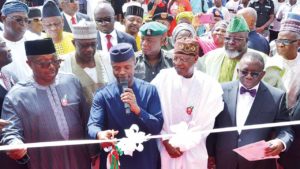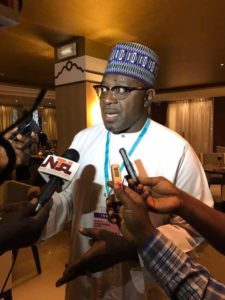
Malam Is’haq Modibbo Kawu, the Director General of the National Broadcasting Commission (NBC) needs no introduction. A prolific writer, ace broadcaster and astute technocrat, Kawu is readily at home in both the print and broadcast media.
In this exclusive interview with the Editor of Time Nigeria Magazine, Abdul Rahman Aliagan, the former General Manager of the Kwara State Television speaks extensively on the commission’s moves to ensure that Nigeria goes digital, builds national content as well as give back to Nigerians the right to access credible information. This is the quintessential Kawu–poignantly affable, but brutally frank. Excerpts.
Nigeria has missed the deadlines for Digital Switch Over (DSO). What are the challenges and what are you doing differently to surmount those challenges to ensure that Nigeria goes digital this year as envisaged?
The fact that Nigeria missed the Digital Switch Over (DSO) in 2012 and 2015 were largely due to a combination of factors. There wasn’t a political will on the part of past government and a lot of issues were affecting the political landscape in the country and which also affected the ability of government to take decision. It makes it difficult for them to definitively take decision to arrive at Digital Switch Over. Because there was no political ambience for the work, NBC and other stakeholders could not take decision on technical, financial and logistic issues. So those are the basic problems that affected the process in the two previous periods.
But by 2016, NBC was able to launch its pilot phase in Jos, in April to be precise, and that in itself was a reflection of the fact that certain things have changed. There was a sum of fund that came into the process as a result of leasing of Spectrum 700 megawatt, which allows NBC to raise funds, I think over $170 million was raised and that kick started the process in terms of making commitments for the set of manufacturers, middleware and different stakeholders for the process and by the end of last year we began a definitive phase of the process, the commencement of Analogue Switch Off (ASO) with the Abuja switch on of December, 22nd 2016. These two decisions showed clearly that Nigeria had moved forward from the previous point where there was tentativeness, where there was no decision making in a definitive manner. So, with what we have done in Jos as well as Abuja… in Jos we gave Nigerians 15 channels, Abuja 30 and that could be replicated in the states we have chosen in the six geopolitical zones of the country.
I think largely, some steps have been taken which hitherto were not done in Nigeria. When we launched Abuja Switch Over on the 22nd of December, 2016, the President of the Federal Republic of Nigeria, who was represented by the Vice President, Prof. Yemi Osinbajo, made a very bold open and public declaration that the government of Nigeria is committed to this process and will do everything to ensure that success is achieved. That is the difference from the previous time.
Going digital requires critical infrastructure, expertise and adequate funding, where does the NBC stand in all these?
Digital Switch Over is a financial, logistic as well as technical challenge for every country that is committed to doing it. This is because we are changing the way television is going to be done in that country. In the past, take Jos for example, may be they were watching three or four channels, Plateau State Television, NTA Jos, AIT, now people are watching 15 and it will be expanded, 15 more channels will be added very soon. That is to tell you that digital television offers you opportunity to have yourselves with a multiplicity of channels and what we have done in Abuja for instance is to calibrate the stations in to local, regional as well as national channels. That is different from the way people used to watch television in the past. We are going to have much more stations in the future. We are going to have specialised stations, stations dedicated to children, women, sports programmes and all kinds of themes we used to know. Things are going to change for the better.
On the other hand, we need a lot of money to be able to procure setup of boxes; the one we imported, 850, 000, cost us $26 million and we need at least 30 million and that is the projection done. If you multiply $35 by 30 million people, that is a huge a lot of money. Even, when our licensed manufacturers are putting in place production on line, they cannot produce 100, 000 in a day. We still have to import a lot of boxes. So, it is a huge financial challenge.
You equally talked about expertise, it is a fact, Nigeria of course has a lot of experts in television but what is happening is that we took a decision consciously, Nigeria Digital Switch Over unlike what happened in many other African countries when foreigners came to run the process, Nigerian designed, Nigerians implementing, Nigerians are running Nigeria digital process, it is unique on the African continent. What we are trying to do in a couple of months is what has taken the United Kingdom six to 10 years to get right, it is a very unique thing and we are up to the challenge. The problem is getting the money in good time.
Building a mass of quality content that will be user- focused and friendly is very central to success of digitisation, how is the commission set to achieve this?
We are taking a decision, which is a national strategic decision; we are going to make sure that 70 percent of all the television in Nigeria will be local content. Even for our sake as a sovereign independent country, we need to take a decision, we can allow casual imperialism in our country. We must, as a leading country on the African continent, as the largest concentration of black people in the world, we must be able to give a direction. We must help other African states to realise that we can do things for ourselves, especially in the realm of culture and television is culture.
If 70 per cent of our content is local, we must have Nigerian young people, because this is population of about 190 million people, the median age is 18.1 years, 63 percent is that age of 25 year and 75 percent are under 35 and this huge population is a very talented population with a lot of latent ability to do much. But there is not enough channeling in the right way of that opportunity. If television then gives that of platform, we are looking at the opportunity of the young Nigerians forming production companies to produce programmes of different genres for our TV. What NBC has done in the last one year… we have organised content development workshops in Lagos, Enugu and Kano, three cities as the heart of production of content in Nigeria. It is impressive to see a huge turnout of producers, directors, scriptwriters and all kinds of talent in the area of content. Part of what we are also planning to do in this digital revolution is that we are going to have what we call Digital Access Fund which is going to be collected from Nigerians for watching television. It is going to be a huge amount of money. NBC will create a Nigerian Board of Trustees of really eminent Nigerians that will run the fund because the fund is going to be in billions and the money will be called National Content Development Fund. This money will then be accessed by Nigerian producers to produce different areas of content and we are going to set a very strict criteria, you must be doing production at certain level, you must have taken part in national process, which we are going to decentralise, it won’t ‘be that all the people getting such fund will be people from Lagos, Kano or Enugu. We are going to have content challenges for instance in the Northeast, we will get the best producers from that area who will be able to get access to that money, in the northwest, south-south and north central.
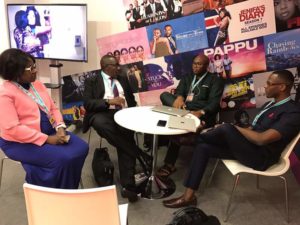
DG, NBC, Mallam Is’haq Modibbo Kawu in a discussion with Content Developers and Programme Producers at a Workshop
All parts of Nigeria will then get the opportunity to access the fund. They will be producing different kinds of programmes for TV such as drama, documentary, entertainment, children and women’s programmes, all kinds of production all over Nigeria for us to feed television with Nigerian content.
For government to ensure huge investment in the broadcasting industry there must be corresponding value. Do you have any business model developed or developing, first, to drive all-inclusive growth in Nigeria as well as maintaining and sustaining the industry for optimal utilisation?
The truth of the matter, according to law, is that Nigerians have the right to access information. If in the past all you needed to do is to buy a television and watch programme but with a new format you must use a setup box. A setup box is a new thing which the Nigerian government has subsidised. Given the cost of production, what we are selling them is much lower. Government has built its premise on the fact that if Nigerians have access to information and you are getting them to do TV in a new way which will change from what they used to do, they might has well put some subsidy and as part of this process, the set up box is an interactive box. It helps government to put all kinds of information and it enhances communication between the people and the government, it will help us to deepen democracy.
For instance, it can be used to conduct an opinion poll of the Nigerian people, if government wants to do a particular thing, it can be used to gauge what Nigerians feel about it through the information portal of the boxes. It can be used for audience measurement; you can use it to know the exact number of people watching a particular programme. You can then use that as a yardstick to place your advert. Government knows that this new platform allows it to communicate better and also get feedback from the Nigerian populace.
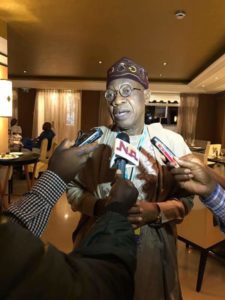
Minister of Information and Culture, Alhaji Lai Mohammed addressing Journalists at MIPTV Conference in Cannes, France
For instance there was a particular time when government said may be Nigeria should sell some assets to get the money to fund development processes. It was ambiguous in terms of feelings. With the new setup box, government can say, do Nigerians agree that government should sell assets? People can vote using the setup boxes and we can see clearly the percentage of people saying yes or no. It is not a profit making thing for government. In the long-run all the content producers will make money, because these are going to be private Nigerian individuals and if you are saying you are running a private sector driven economic process, this falls into that phrase absolutely.
The place of strategic thinking, research collaborations, and partnerships with stakeholders, national and international, is very central to the success of any digitised environment, what is your take on this?
Without any doubt, we are collaborating with useful organisations at home and abroad to ensure that the process is run smoothly. For instance, the Association of Local Government of Nigeria (ALGON) is one of our major stakeholders because it is the local government historically in Nigeria that has the constitutional right to collect TV and Radio licences. But they have never really been able to do it. So it is our platform that offers the opportunity, we are working with them.
The Broadcasting Organisation of Nigeria (BON) is actually the aggregate of broadcast owners and in the long-run it is the content that they put as content providers that would go on television as part of our stakeholders group. Then we have Digital Mutual Group set up by government to be the technical body that actually delivers this digital process.
We have international collaborators, the people who are manufacturing the boxes with us, the company that provided the middleware, Conditional Access System as well as PayPal that puts in place the process which we are able to do our Call Centre Management System. It’s both a platform of local access as well as international collaborative relationships.
With the commencement of DSO in Jos, Plateau and Abuja there were pockets of complaints from end users, what are you doing to resolve them?
Essentially, it is about the activation of boxes, the problem was a simple one, you know Nigerians are very impatient, it is in our nature. There was a number, when you put on that box a number appears but we had stopped using that particular number because we had a dispute with the company we initially used and we went for another company with a different set of numbers. When you go to buy the box, you will be given a flyer that tells you these are the numbers you are to enter, not the one on your box. Supposing you get home and you put up the old number and the box does not recognise the number and that is why people are complaints.
We communicated this on radio, on television, telling people they can activate through a call or text to our call centre. After that we had a very smooth process, only 13 boxes that were returned back to us out of 251, 000 boxes distributed in Abuja. So in terms of what we did with the boxes, we eventually did a marvelous job.
Let me give you an example, when we launched our Call Centre, we assumed that 30 call agents are enough, 10 in the morning, 10 in the afternoon and 10 in the night, but we got to a point where we increased the number of call agents to 90 in a day, 30 in the morning, 30 afternoon and 30 in the night because we get hundreds of thousands of calls and this we had to manage and because we are going to go to six states now, call agents operation will increase may be to 120 per day, because we are going to get calls from six states simultaneously that will be a big challenge to us. But we are working on it, we have had a lot of lessons from what we have done so far in Abuja since December.
The mandate of the commission is not limited to broadcasting alone, it also covers academic sector by a way of curriculum development in line with global best practices in digitisation. What are you doing in this aspect?
Yeah! It is an era that not a lot has been done, there is a level of overlapping, Presidential White Paper said that we should bring together all the different training institutions to work with them at a level to make production of manpower for broadcasting much better than it used to be. So that is the central part of what we are going to be doing as we gather space around the country. It is an era that we had learnt much about the past and it is something we have to open up because there is an experiential gap in the broadcasting industry today and is affecting the process, the very high literates in broadcasting have moved on, a much younger population who don’t have connection with the experience of the past, quite frankly do things in a much more unprofessional way as it used to be done in the past. Where there is an influx of broadcasting in our country, the level of professionalism has dropped significantly, so it is the duty of NBC to play a role in helping to improve the quality of professionalism in the country and getting people to understand that there are basic rules of doing things like production, presentation and all the different areas of broadcasting.
There is a problem of none adherence strictly to the rule and regulations guiding the conduct of broadcasting in Nigeria by broadcasting stations. How do you intend to tackle this?
Majorly, our duty is to ensure that people operate on the basis of Nigerian Broadcasting Code, which literally is the bible of broadcasting industry. What NBC does is to monitor on 24-hour basis stations around Nigeria. We have 10 Zonal offices and 24 state offices around Nigeria. The majority of our staff are actually broadcast monitoring people and that is what we do on daily basis. We get a weekly monitoring report from every part of Nigeria and these reports are gathered on daily basis. So NBC does a lot in terms of monitoring, we are telling stations to stop programmes or advert that we feel are running contrary to our code of operations. Stations are fined, stations are warned but the final point is to take out the station. NBC does this in a permanent basis. We have Directorate of Investigation and Enforcement which investigates issues and enforces sanctions if we have to. We have a very elaborate structure of monitoring people and punishing stations on regular basis.
The 2015 General Elections were adjudged to have been characterised by hate speeches on broadcast media, very soon, 2019 election process and campaign will kick-off. How prepared are you to contain this professionally?
When I became the Director General of NBC in May last year, I spoke to members of staff and management members and one of the issues I raised is the credibility of NBC as an institution and the fact is that the credibility of the institution was damaged by the manner the institution itself got soaked into the electoral process during 2015 general elections. It was unable to play its role and stay above the fray and look at what people are doing as a result of political interference. We commissioned a Nigerian consultancy to do a general study on NBC itself. We did a major study of hate speeches in our country, partly because we want to put in place a new element in Nigerian Broadcasting code as relates to hate speech and to help policy development in our country as well as legislation. The study we are doing will be brought to the next review process of broadcasting code. We are going to involve broadcasting stakeholders in the country to be part of the process. So we are taking hate speeches very seriously because it is one of the problems facing democracy in our country.
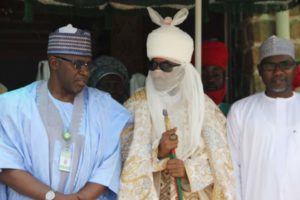
Mallam Is’haq Modibbo Kawu flanked in a photograph with the Emir of Kano, Royal Highness Alhaji Sanusi Lamido II in an occasion
One of the issues I have spoken about recently is that we have abused the phone-in format of radio because it is very easy to set up. People use that to allow all kinds of guests to come on air and profile the other person, other ethnic groups, other religions and so on and so forth.
All these fixed in to the crazy hate speeches syndrome. It must not be allowed in broadcasting to cause a major crisis in our country.
You would recall a genocide crisis in London, Radio played a major role in stoking the embassy and that reality should give all of us a pause in our country, on the African continent and the world. NBC is much alive to this reality and we are taking bold steps to assist the country.
What are other initiatives on the agenda in taking the Nigerian Broadcasting industry to the next level of socio-political and economic development?
You see, NBC as regulatory agency itself has to be modern, it must be technology-driven, I visited the Regulatory Body for Communication and Broadcasting in England OFCOM sometimes last year and we are talking about the possibility of collaborating relationship with them. I equally visited a commission in France too. We are trying to look at the best practices and see how we can learn from those practices to improve our own work here. I am trying to put together a visit by people from OFCOM to come and sit down with our people to look into the way we operate and we listened to suggestions so that we can improve our work. The institution itself must become a 21st century institution, so that we can then set benchmarks for the stations that we regulate, that is very vital. I want to be able to say at the end of my tenure here, that I am able to take this institution to the highest level of professionalism and technological serving institution in the 21st century. We would regulate, monitor our broadcasting industry in the best professional manner and help the growth of our industry. I have only 793 radio and television stations at the moment, we have a huge amount of applications. People are asking to do radio, television, community station, campus radio and television channels, DTT, DTH, OTT and IPTV, a lot of development coming to the industry. NBC must be able to regulate them at a level that allows us to build this industry with the highest level of professionalism. That is our hope and we will try as much as possible to do our best.




